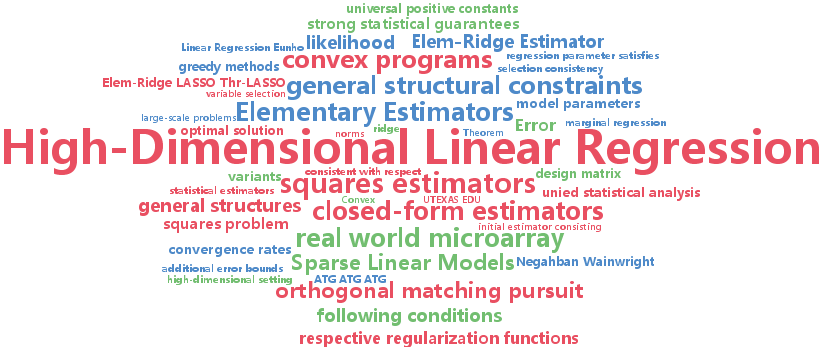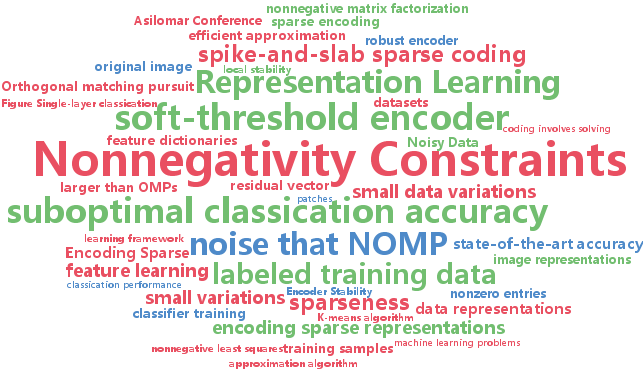orthogonal matching pursuit
-
Zheng Wang and Ming-Jun Lai and Zhaosong Lu and Wei Fan and Hasan Davulcu and Jieping Ye
Rank-One Matrix Pursuit for Matrix Completion (pdf)
Low rank matrix completion has been applied successfully in a wide range of machine learning applications, such as collaborative filtering, image inpainting and Microarray data imputation. However, many existing algorithms are not scalable to large-scale problems, as they involve computing singular value decomposition. In this paper, we present an efficient and scalable algorithm for matrix completion. The key idea is to extend the well-known orthogonal matching pursuit from the vector case to the matrix case. In each iteration, we pursue a rank-one matrix basis generated by the top singular vector pair of the current approximation residual and update the weights for all rank-one matrices obtained up to the current iteration. We further propose a novel weight updating rule to reduce the time and storage complexity, making the proposed algorithm scalable to large matrices. We establish the linear convergence of the proposed algorithm. The fast convergence is achieved due to the proposed construction of matrix bases and the estimation of the weights. We empirically evaluate the proposed algorithm on many real-world large scale datasets. Results show that our algorithm is much more efficient than state-of-the-art matrix completion algorithms while achieving similar or better prediction performance.
-
Eunho Yang and Aurelie Lozano and Pradeep Ravikumar
Elementary Estimators for High-Dimensional Linear Regression (pdf)
We consider the problem of structurally constrained high-dimensional linear regression. This has attracted considerable attention over the last decade, with state of the art statistical estimators based on solving regularized convex programs. While these typically non-smooth convex programs can be solved in polynomial time, scaling the state of the art optimization methods to very large-scale problems is an ongoing and rich area of research. In this paper, we attempt to address this scaling issue at the source, by asking whether one can build \emph{simpler
-
Xiaotong Yuan and Ping Li and Tong Zhang
Gradient Hard Thresholding Pursuit for Sparsity-Constrained Optimization (pdf)
Hard Thresholding Pursuit (HTP) is an iterative greedy selection procedure for finding sparse solutions of underdetermined linear systems. This method has been shown to have strong theoretical guarantees and impressive numerical performance. In this paper, we generalize HTP from compressed sensing to a generic problem setup of sparsity-constrained convex optimization. The proposed algorithm iterates between a standard gradient descent step and a hard truncation step with or without debiasing. We prove that our method enjoys the strong guarantees analogous to HTP in terms of rate of convergence and parameter estimation accuracy. Numerical evidences show that our method is superior to the state-of-the-art greedy selection methods when applied to learning tasks of sparse logistic regression and sparse support vector machines.
-
Tsung-Han Lin and H. T. Kung
Stable and Efficient Representation Learning with Nonnegativity Constraints (pdf)
Orthogonal matching pursuit (OMP) is an efficient approximation algorithm for computing sparse representations. However, prior research has shown that the representations computed by OMP may be of inferior quality, as they deliver suboptimal classification accuracy on several im- age datasets. We have found that this problem is caused by OMP's relatively weak stability under data variations, which leads to unreliability in supervised classifier training. We show that by imposing a simple nonnegativity constraint, this nonnegative variant of OMP (NOMP) can mitigate OMP's stability issue and is resistant to noise overfitting. In this work, we provide extensive analysis and experimental results to examine and validate the stability advantage of NOMP. In our experiments, we use a multi-layer deep architecture for representation learning, where we use K-means for feature learning and NOMP for representation encoding. The resulting learning framework is not only efficient and scalable to large feature dictionaries, but also is robust against input noise. This framework achieves the state-of-the-art accuracy on the STL-10 dataset.



